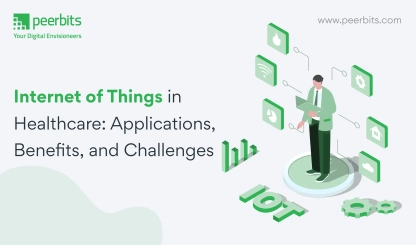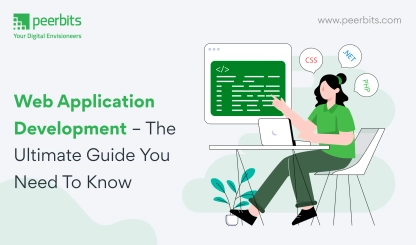The IoT in fintech is changing how financial services handle transactions, security, and customer interactions. With connected devices, banks and fintech firms can automate processes, monitor real-time data, and reduce fraud risks. These innovations help businesses operate more efficiently while improving service quality.
Traditional financial systems still face issues like slow processing, security threats, and outdated decision-making. Manual verification leads to delays, and legacy infrastructure struggles to keep up with industry demands. To overcome these challenges, financial institutions are integrating IoT for smarter, data-driven solutions.
According to Verified Market Research, the IoT in financial services market is set to surpass USD 2.61 billion in 2024 and grow to USD 52.38 billion by 2031. The increasing demand for automation and real-time financial insights is driving this expansion.
This blog explores the IoT impact on fintech, covering smart payments, fraud prevention, and personalized banking. Whether you’re in banking, insurance, or investment, understanding IoT’s role can help improve security, efficiency, and customer experiences.
Understanding IoT’s role in fintech
The IoT in fintech is creating new ways for banks and financial institutions to operate. With connected devices, real-time data, and automation, businesses can improve security, transaction speed, and customer experience. The shift toward IoT-enabled financial services is making traditional processes more efficient and data-driven.
What is IoT in fintech?
IoT in fintech refers to the use of connected devices that collect, share, and process financial data. These devices include smart payment terminals, biometric ATMs, and IoT-powered security systems. They help automate transactions, detect fraud, and provide real-time financial insights.
How IoT devices connect and exchange financial data
IoT devices in financial services work through sensors, cloud computing, and APIs. These components allow banks to collect transaction data, monitor assets, and analyze spending patterns in real time. This connectivity helps businesses make faster and more accurate financial decisions.
Read more: Role of Blockchain in the FinTech & Banking
Role of AI, machine learning (ML), and blockchain in IoT fintech
AI and ML analyze vast amounts of financial data from IoT devices, identifying fraud risks and predicting customer behavior. To fully leverage this synergy, many fintech firms now develop blockchain apps that combine IoT data analytics with decentralized ledger security. Blockchain adds an extra layer of security, ensuring transparent and tamper-proof transactions. These technologies together improve security, efficiency, and customer trust.
Differences between conventional fintech and IoT-enabled fintech
- Conventional fintech relies on manual verification, limited automation, and centralized data storage.
- IoT-enabled fintech integrates connected devices, real-time monitoring, and decentralized security measures, improving efficiency and risk management.
Key drivers of IoT adoption in fintech
The rise of contactless payments, real-time financial analytics, and growing security threats are pushing fintech firms to adopt IoT. Businesses are also using IoT for personalized banking experiences, ensuring faster transactions and improved fraud detection.
Rise of contactless transactions and digital wallets
Consumers prefer faster, more secure transactions through mobile banking apps. IoT-powered payment terminals and digital wallets enable seamless contactless payments, reducing dependency on cash and physical cards.
Growing importance of real-time financial data analytics
Banks and fintech companies use IoT-driven data analytics to track spending behavior, detect anomalies, and provide personalized financial recommendations.
Increasing security threats in financial transactions
Cyber threats are rising, making IoT-driven biometric authentication, fraud detection, and secure payment solutions essential for financial institutions.
Demand for hyper-personalized banking experiences
IoT-powered insights help banks offer tailored financial services, such as AI-driven budgeting tools, smart loan approvals, and location-based financial recommendations.
How IoT is transforming banking and financial services
IoT is shifting banking from manual processes to smart automation, allowing real-time decision-making, cost reduction, and better security. Financial institutions benefit from faster loan approvals, fraud prevention, and efficient banking operations powered by connected devices.
From manual banking to smart banking
Traditional banking involves manual verification, physical documents, and long processing times. IoT automates these processes, making banking more efficient and reducing human errors.
The impact of real-time decision-making in fintech
IoT-driven real-time data helps financial institutions assess creditworthiness, approve loans faster, and detect fraud instantly. These capabilities improve service quality and customer trust.
How IoT reduces operational costs and improves efficiency
Automating processes through IoT app development devices reduces labor costs, minimizes errors, and streamlines banking operations. Banks can also use IoT-powered predictive maintenance to keep ATMs and payment systems running smoothly.
IoT in payments and transactions
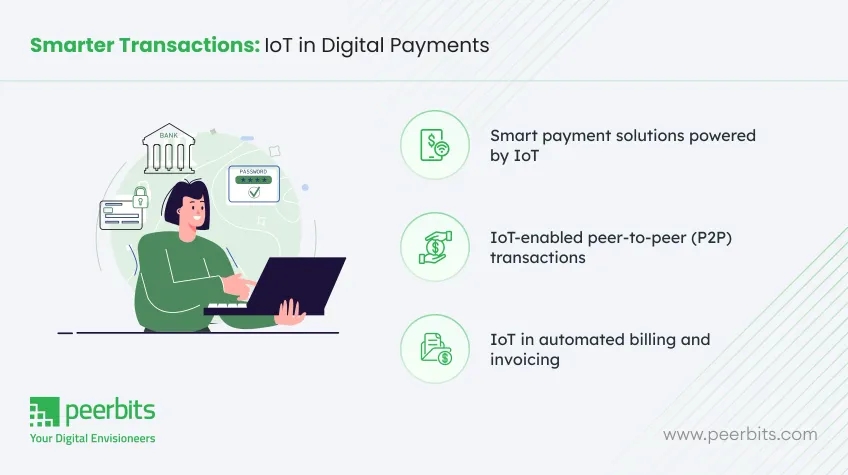
IoT is making payments faster, safer, and more automated. From wearable payments to voice-activated transactions, IoT-powered solutions are improving convenience while enhancing security in financial transactions.
Smart payment solutions powered by IoT
Wearable devices like smartwatches and rings enable quick, tap-to-pay transactions. Biometric authentication methods such as fingerprint and facial recognition add an extra layer of security to digital payments.
IoT-enabled peer-to-peer (P2P) transactions
Smart assistants now facilitate voice-activated payments, while blockchain-powered IoT solutions enable secure cross-border transactions. Smart contracts further automate and speed up payment settlements.
IoT in automated billing and invoicing
Businesses use IoT sensors for subscription-based billing, ensuring accurate and automated charges. IoT also enables real-time tracking of B2B payments, improving cash flow management and transaction transparency.
IoT-driven fraud detection and risk management
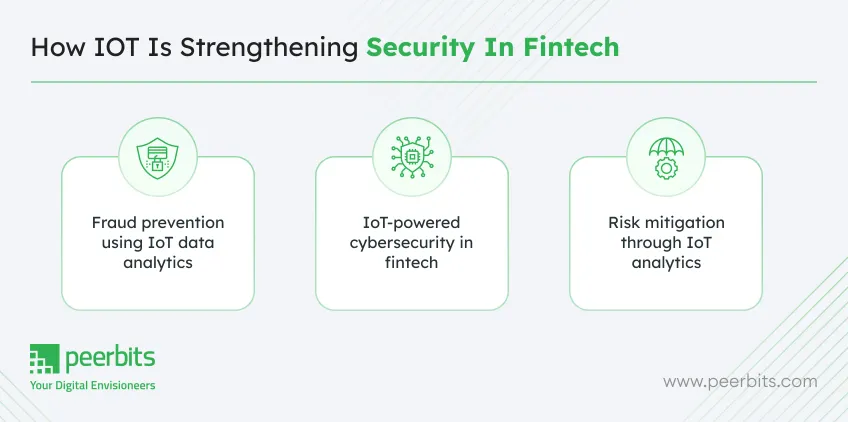
Financial fraud is becoming more sophisticated, but IoT is strengthening security with real-time monitoring and predictive analytics. By analyzing transaction patterns and integrating AI, financial institutions can detect threats before they cause damage.
Fraud prevention using IoT data analytics
IoT devices track transaction patterns in real-time, identifying unusual activities instantly. Geolocation-based validation prevents unauthorized access, while AI-driven behavioral analysis helps predict fraudulent behavior.
IoT-powered cybersecurity in fintech
Multi-factor authentication (MFA) using IoT-enabled biometrics adds security layers. Blockchain-backed decentralized verification prevents tampering, while IoT-driven security monitoring continuously scans for cyber threats.
Risk mitigation through IoT analytics
Banks use IoT for credit risk assessment, analyzing spending habits and financial behaviors. AI-powered models also predict loan defaults, helping institutions make informed lending decisions.
Optimizing banking infrastructure with IoT
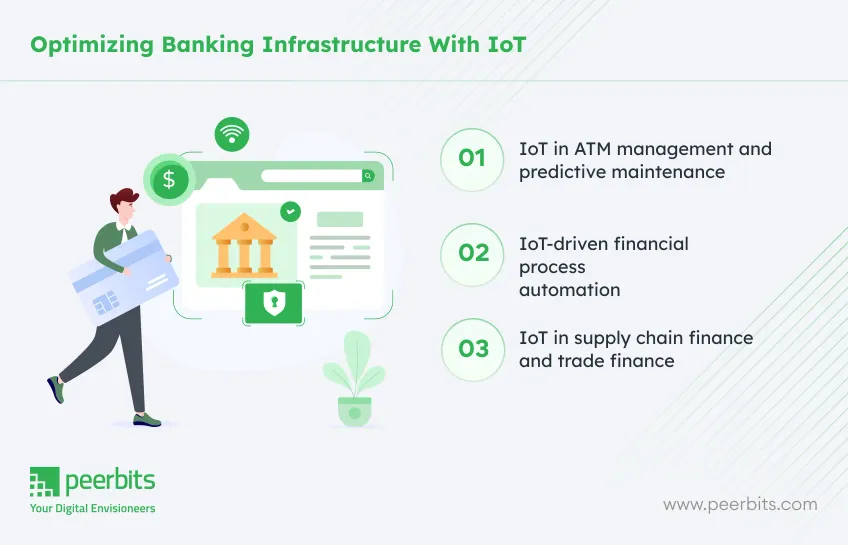
IoT is improving banking operations by making ATM management, financial automation, and trade finance more efficient. Smart devices help banks reduce downtime, cut costs, and enhance customer service.
IoT in ATM management and predictive maintenance
Smart sensors track cash levels in ATMs, preventing shortages. Predictive analytics detects potential malfunctions, allowing proactive maintenance. Real-time surveillance enhances security monitoring to prevent fraud.
IoT-driven financial process automation
IoT speeds up loan approvals by automating document verification. AI-powered virtual banking assistants handle customer queries, improving response times and reducing manual workload.
IoT in supply chain finance and trade finance
IoT-powered tracking ensures real-time visibility of financial assets in global trade. Smart contracts automate secure payments, reducing delays and minimizing risks in supply chain transactions.
Enhancing customer experience and engagement
IoT is making banking more personalized by providing real-time insights, predictive analytics, and AI-powered recommendations. Financial institutions can better understand customer behavior and offer tailored services.
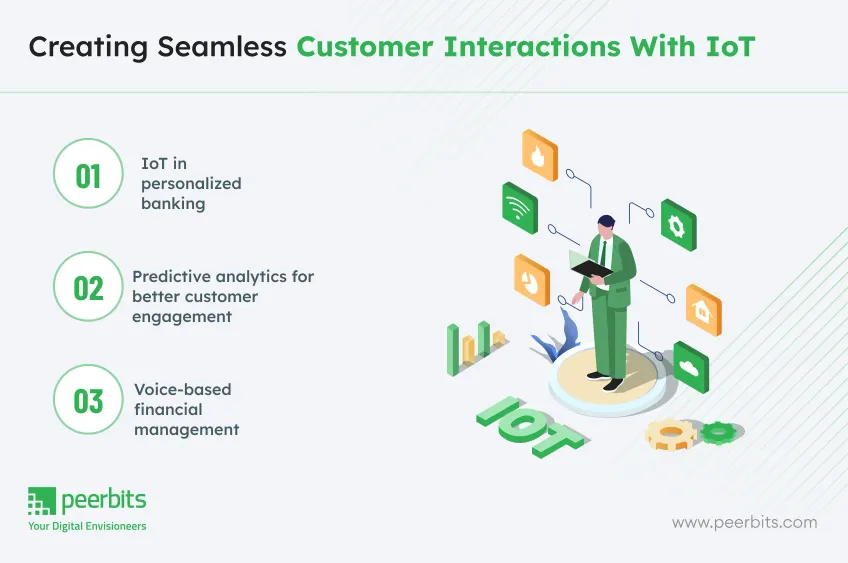
IoT is making banking more personalized by providing real-time insights, predictive analytics, and AI-powered recommendations. Financial institutions can better understand customer behavior and offer tailored services.
IoT in personalized banking
IoT analyzes spending patterns to help customers manage their finances. AI-driven investment tools offer real-time advice, guiding users toward smarter financial decisions.
Predictive analytics for better customer engagement
Banks use IoT to track spending behavior, offering personalized financial product recommendations. AI-driven insights help customers choose credit options, investment plans, and insurance based on their financial habits.
Voice-based financial management
Smart assistants powered by IoT help users budget and save through voice commands. Customers can also track their investment portfolios in real time, ensuring better financial control.

Driving financial inclusion with IoT
IoT is helping financial institutions expand access to banking services in remote and underserved areas. Mobile banking, biometric authentication, and smart kiosks are making financial services more inclusive.
Banking the unbanked through IoT
IoT-powered mobile banking solutions connect people in remote areas to financial services. Biometric authentication simplifies account access, ensuring security and ease of use.
IoT in microfinance and rural banking
IoT-driven credit scoring models help assess loan eligibility for underserved populations. Mobile ATMs and smart iPad kiosks improve financial accessibility, reducing dependence on physical bank branches.
IoT in insurance and wealth management
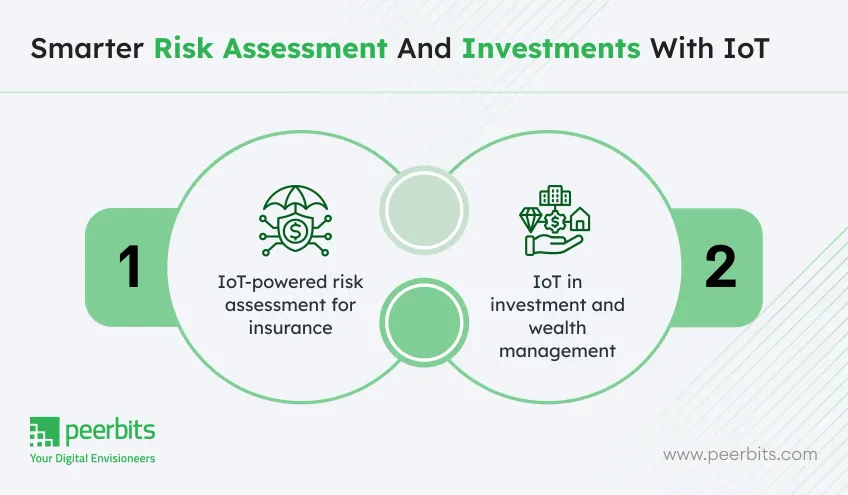
IoT is reshaping risk assessment, policy pricing, and investment strategies. Insurers and wealth managers are using real-time data to make informed decisions, improving efficiency and customer experience.
IoT-powered risk assessment for insurance
Usage-based insurance (UBI) leverages IoT tracking to customize policies based on real-time data. Health insurers use IoT wearables for continuous health monitoring, refining premium calculations.
IoT in investment and wealth management
IoT enables automated wealth transfers based on real-time market conditions. AI-powered stock market insights help investors make data-driven financial decisions, optimizing portfolio performance.
The regulatory landscape and compliance challenges
The expansion of IoT in fintech brings strict regulatory requirements. Financial institutions must navigate complex compliance frameworks while safeguarding user data and transaction security.
Data privacy and cybersecurity regulations
Regulations like GDPR and CCPA set strict guidelines for IoT-driven financial data handling. Banks and fintech firms must mitigate cybersecurity risks in IoT transactions to prevent breaches and fraud.
Legal challenges of integrating IoT in fintech
IoT-powered transactions face cross-border regulatory complexities, especially in international payments. Compliance with global financial reporting standards is essential to maintaining transparency and trust.
IoT’s impact on corporate banking and enterprise finance
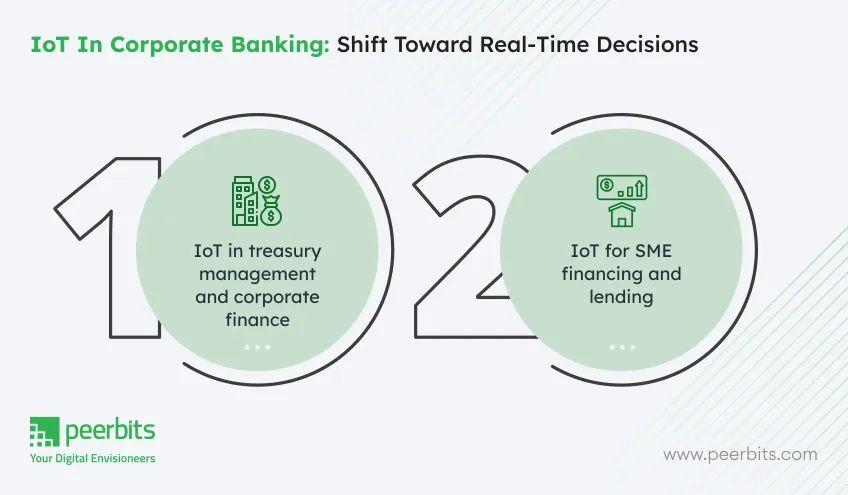
Large enterprises and SMEs are leveraging IoT to improve financial decision-making, optimize cash flow, and streamline lending processes. Real-time data insights help businesses manage risks and improve financial efficiency.
IoT in treasury management and corporate finance
Banks and corporations use IoT to enhance cash flow forecasting with real-time financial data. Smart IoT-enabled expense tracking helps enterprises monitor transactions and reduce financial inefficiencies.
IoT for SME financing and lending
Small businesses benefit from IoT-based loan underwriting, enabling faster and more accurate credit assessments. Automated risk analysis improves business credit approval processes, reducing delays and manual errors.
The future of IoT in fintech
As IoT adoption grows, fintech firms are exploring new innovations to improve financial services. Advanced AI, faster connectivity, and automation will drive the next phase of IoT-powered finance.
Emerging trends and innovations
The combination of AI and IoT is making predictive financial analytics more precise. With 5G connectivity, transactions are becoming faster and more intelligent, enhancing real-time financial decision-making.
Challenges and risks ahead
Despite its benefits, IoT-powered fintech application faces cybersecurity risks, requiring stronger fraud detection measures. Another challenge is managing large volumes of real-time data, which demands advanced processing capabilities.
Strategies for fintech firms to utilize IoT effectively
To maximize IoT’s potential, fintech companies must adopt best practices for implementation, ensuring secure and efficient integration. IoT-driven automation will help financial services stay competitive and future-ready.
Conclusion:
IoT is changing how financial services work. Payments are becoming faster, fraud detection is getting smarter, and banking operations are running more smoothly. Companies using IoT in fintech software are improving efficiency while offering better customer experiences.
Staying ahead means using AI-driven analytics, real-time automation, and secure IoT networks. Businesses that build the right IoT strategies can cut costs, reduce risks, and provide seamless financial services.
With technology moving fast, fintech firms need to be ready. Investing in scalable and secure IoT solutions today will shape the future of financial services.


